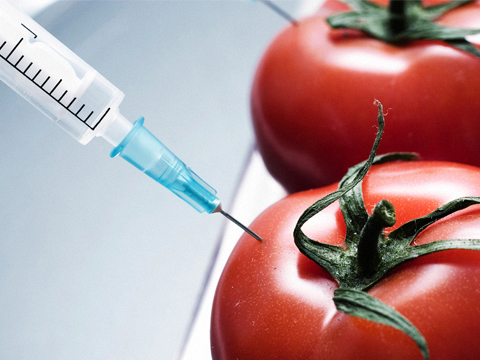Debates around GMO foodstuff on the rise in Armenia

By Mushvig Mehdiyev
A new challenge has joined the range of political and economic posers in Armenia - debates around genetically modified organisms in food is on rise in the country those days.
Recently, social media in Armenia have raised the issue of possible genetically modified crops in the country. Some consumer protection activists have paid particular attention to tomatoes and cucumbers, claiming that those vegetables, sold in the country's markets "smell and taste of fish", which, for them, is proof they were genetically modified.
Since GMO presence in foodstuff is becoming a real matter of concern, environmentalists have also joined the protesting crowd, saying it may be detrimental to public health.
Head of For Sustainable Human Development NGO, Karine Danielyan believes that having such smells and tastes can only be explained by two things, one of which being genetic modification.
"Now it is practiced in the world that a fish gene is included
into tomato crops to improve the vegetable's durability in the
cold. But I can't say if it can give the product such a taste
however. This fish taste could also be the result of farmers' using
fish farms' water for irrigation purposes,” Danielyan told
ArmeniaNow, local media outlet.
Over the past century science developed by leaps and bounds and now
genetic engineering techniques are able to alter the original
genetic make up of things. The main goal of genetic engineering is
to add a new trait to the plant which it does not have by natural
design. For instance GMO in a food crop creates strong immunity
against certain pests, diseases, or environmental conditions. It
also serves to reduce the spoilage or to increase resistance to
chemical treatments or to enrich the nutrient profile of the
crop.
Besides its reinforcing sides, genetic engineering has also led to
a great deal of controversy around the world - healthcare devotees
have called to reject GMO in food products, while proponents of the
idea support such products as they help solve food supply
problems.
Danielyan said laboratory examinations will help better to
understand whether fish-smelling vegetables have been genetically
modified or not. The National Academy of Sciences of Armenia has
relevant laboratories, but they need funding in order to launch
such expensive studies, she added.
Worldwide practice proved the GMO factor is standing behind certain
diseases including cancer, infertility, allergies and various kinds
of other maladies.
Meanwhile, the authorities in Armenia insist that GM food is
under full control, while the use of such products may be
instrumental in solving social problems.
In European Union countries, the admissible amount of GMO in food
products for adults has been set at 0.9 percent. The EU rules
clarify that all imported GMO food have to be labeled and separated
along the supply chain to safeguard against “contamination” of
organic farms. Food products designed for children must be
GMO-free.
In July, 2010, a research laboratory belonging to the organization Standard Dialogue launched a study into the issue of GMO existence in foodstuff in Armenia.
The lab found genetically modified products in a research study that was comprised of some 40 percent of consumer goods available in showcases across Armenia. These included both imported and locally grown products. Tests showed that some 15 percent of the meat products could be described as genetically modified.
- - -
Follow Mushvig Mehdiyev on Twitter: @Mushviggo
Follow us on Twitter: @Azernews
